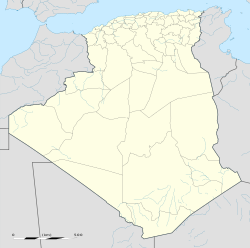Saïda, Algeria
|
Saïda سعيدة |
|
|---|---|
| City | |
| Motto: "From the people, for the people" | |
 Location of Saïda in the Saïda Province |
|
| Location of Saïda in the Algeria | |
| Coordinates: 34°50′00″N 0°09′00″E / 34.833333°N 0.15°E | |
| Country |
|
| Province | Saïda Province |
| District | Saïda District |
| Government | |
| • Type | Municipality |
| Area | |
| • Total | 75.62 km2 (29.20 sq mi) |
| Elevation | 980 m (3,220 ft) |
| Population (2008 census) | |
| • Total | 142,497 |
| • Density | 1,900/km2 (4,900/sq mi) |
| Time zone | CET (UTC+1) |
| Postal code | 20000 |
| ISO 3166 code | CP |
Saïda (Arabic: سعيدة) is the capital city of Saïda Province, Algeria.
Saïda is located in north-western Algeria, on the southern slopes of the Tell Atlas mountain range situated on the northern fringe of the High Plateaus (French = Hauts Plateaux). The city lies along the right bank of the Wadi Saïda, protected by wooded mountains on the opposite shore that rise steeply from the valley floor to an elevation of some 4,000 feet (1,200 metres).
Saïda, Algeria
Saïda, Algeria
Saïda, Algeria
The city’s site has been of military importance since the construction of a Roman fort. Saïda was a stronghold of Abd al-Qadir, the Algerian national leader who burned the town as French forces approached it in 1844.
Modern Saïda was founded as a French military outpost in 1854 and once housed a regiment of the French Foreign Legion. Its growth was stimulated by the arrival of the Oran-Béchar (narrow-gauge) railway, which was incorporated in 1862.
In 2005 the population was 158,856 inhabitants. It is nicknamed the city of waters, because of its abundant underground springs. The area is forested and the main products of the town are cereals Wool, leather and bottledmineral waters.
Saïda is served by a narrow gauge railway from Mohammadia, however a standard gauge line is proposed.
Coordinates: 34°50′N 0°09′E / 34.833°N 0.150°E
...
Wikipedia

